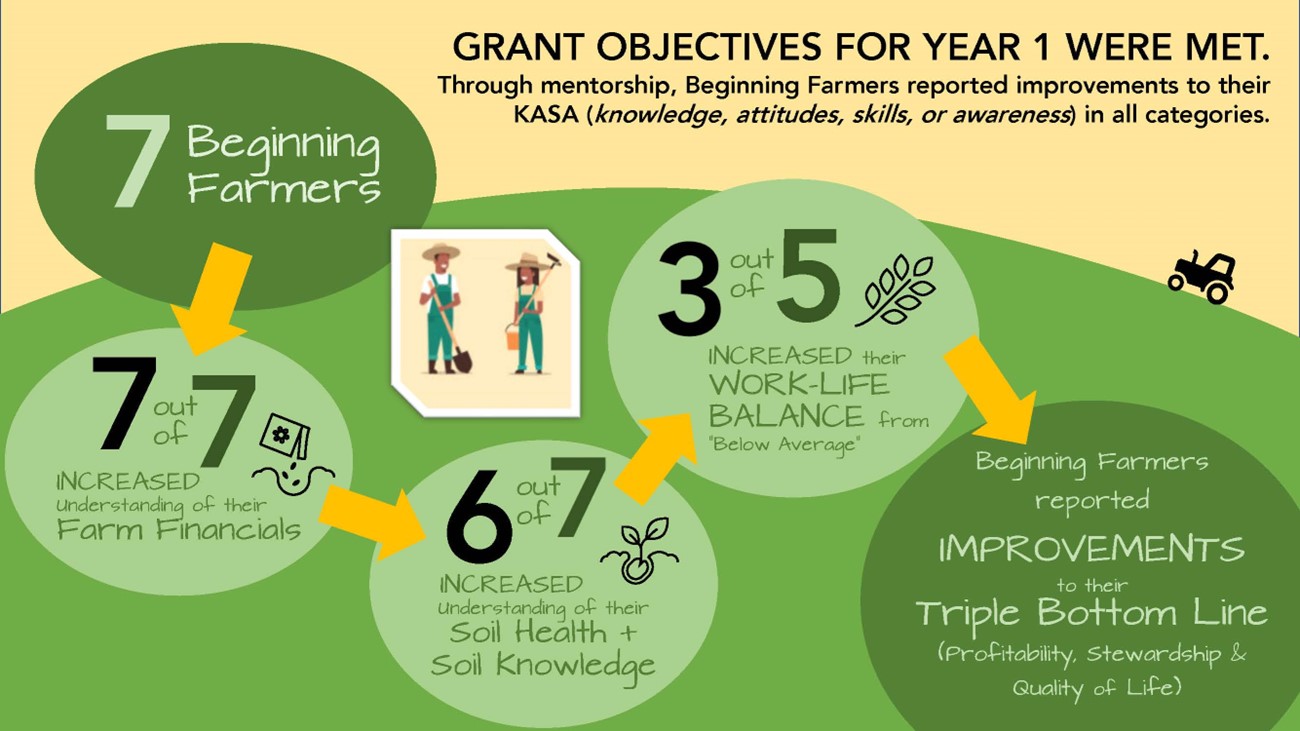Mentors matter for new farmers
Michigan Sustainable Farm Mentors program connects 42 beginning and aspiring farmers with experienced farmers.

Can five hours change the path to success for a beginning farmer? Yes! Survey results from the first year of the Michigan Sustainable Farm Mentors program shows that meeting with an experienced farmer mentor and a peer for just five hours over the course of a year improved the triple bottom line for seven beginning farmers, as explained in the image below. All seven increased their understanding of farm financials and six out of seven improved soil health and their knowledge of soils. Of the five who began with poor work-life balance, three felt it improve to “average” over a year that included meetings with their mentor.

Beginning farmer mentee, Todd H., shared that “It was great to have access to someone with so much experience and expertise in the same farming enterprise as I am in.” Dani F. was awarded a $5,000 grant from the American Farmland Trust Brighter Future Fund due to a recommendation by her mentor. Dani also had “really helpful conversations with my mentor Rachel about getting into the wholesale game.”
The seven experienced farmer mentors tended to use the word inspired to explain their own benefits from connecting with new farmers. Alex Cacciari of Seeley Farm near Ann Arbor, MI stated, “I was surprised to find that my meetings with mentees always left me newly inspired about my own farm business.” Similarly, Joannée DeBruhl, shared that she was “inspired by my new farmers and all the new and exciting ways they want to use the land.”
In addition to meeting with a beginning farmer, the mentors each met with one aspiring farmer to discuss how to find land and credit, how to build farm and business skills and how to plan for success on their own future farms. One notable success was a mentee who found farmland to lease because of a recommendation by her mentor. In the words of the aspiring farmers:
“Getting matched up with Joannée was really perfect, and getting to have a continued relationship with her is invaluable. The resources Katie provided especially regarding land and credit access are also amazing. The most valuable thing I’ve come out with is confidence!” –Rowan, Aspiring Farmer Mentee
“Connecting with established farmers and aspiring farmers has helped a lot. I think networking and having people to bounce ideas off of is extremely helpful because farming can feel overwhelming at times. By networking, you can potentially find someone who has experience with an issue that you are facing on your farm and they can help you find a solution.” -Andy N., Aspiring Farmer Mentee
The second year of survey results tracking 29 more mentees will be shared in the next few months.
Although funding for this mentorship project will end in 2023, lessons learned are informing the development of plans for mentors as part of USDA’s new Transition to Organic Partnership Program (TOPP). Michigan Sustainable Farm Mentors coordinator Katie Brandt has been working with leaders of other mentor programs from 11 states in the Midwest to design a TOPP mentorship program for farmers pursuing organic certification starting this fall. Michigan partners will include the MSU Organic Farmer Training Program, MSU Extension, Michigan Association of Conservation Districts, Michigan Food and Farming Systems (MIFFS) and others.
Please reach out to Katie Brandt at brandtk7@msu.edu if you would like to learn more about Michigan Sustainable Farm Mentors, the Transition to Organic Partnership Program or the Toolkit to Start a Great Farm Mentorship.
This material is based upon work that is supported by the National Institute of Food and Agriculture, U.S. Department of Agriculture, under agreement number 2020-38640-31522 through the North Central Region SARE Partnership grant program, under project number ONC21-085. USDA is an equal opportunity employer and service provider. Any opinions, findings, conclusions, or recommendations expressed in this publication are those of the author(s) and do not necessarily reflect the view of the U.S. Department of Agriculture.



 Print
Print Email
Email

